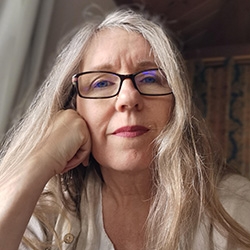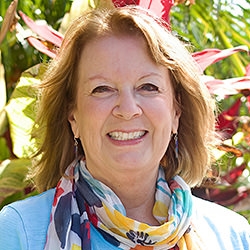
Search Results: death
-
It seems death cafes are everywhere these days. But how changed are we by the conversations we're now having? Not everyone is open to talking about death. It may well be that someone in your life is nearing the end of their days and their refusal to talk about it may be confusing and disheartening. How do you get them to speak when they don't want to? In this session, we will explore different approaches to navigating this tricky terrain.
-
-
No one on their deathbed wished they worked more. Working is unlikely to bring a meaningful life. And yet greeting friends with survivalist expressions, such as, "I'm dead-tired", can feel like affirming our own worth. Taking time off can bring inner spaciousness, ease, rest and consequently time to meet life, to really meet it. Which brings more clarity into the question of what we would like to celebrate on our deathbed.
-
Mourning, grief and celebration is a way to connect with what we love and want to honor. In this trainer tip we learn that these three things can become a way for us to understand our emotions regarding our losses and appreciations.
-
Mourning is not just a process that happens after someone dies: it's an experience we go through with loss of any kind. Here, Shantigarbha offers us seven tips for working with mourning and healing.
-
In pandemic many are asked to stay home. If we are experiencing violence at home we're also most at risk of harm or death if we leave. There are also less visible pieces at work. In this situation, acknowledging our pain, needs and experience can lighten the internal load to meet what is real, and claim our truth. We can do the same for our kids. This can open more pathways forward, and provide strength to leave when its more viable.
-
The American mythos of Independence Day is that liberty, equality, and opportunity are for all. Yet since the country's formation, these needs have been for some at the expense of others. It started with the brutal robbery and genocide of Native Americans and slavery of Africans. And this theme continued for generations in various forms, including how we related to other peoples, countries, and the ecosphere. To achieve true justice, liberty, and opportunity for all we may need to overcome the ego's sense of separation. Compassionate noncooperation may also be key.
-
There are many polarizing issues we can resist and fight over. The word "resistance" can mean fighting against what we don’t agree with in counterproductive ways. It can also be the illusion and futility of mentally fighting against reality of 'what is'. But acceptance, non-resistance, of what is doesn’t mean powerless resignation. Another way to resist is to accept and love whole-heartedly, with empathy and care for the people doing the things we are resisting.
-
First, on the personal side… I’ve already planted half of my vegetable garden and it was so completely enjoyable. Remember how challenging this was for me a couple of years ago? My inner jackal did have a few things to say this year, but not nearly as many as in past years. And, I gave her loads of empathy so we made it through. I am thrilled about this. I can’t wait to see my seedlings pop up! If it’s a successful garden, I’ll share pictures in a future letter.
-
Have you ever gotten a fishing line all tangled up? You got so frustrated you just started yanking on the different loops of line, which of course made the knots and tangles even tighter and more difficult to untangle. Wouldn’t it be great if you could notice the minute you were starting to tangle things up in a discussion with your loved one?
-
-
Using real-life examples from class participants, Sylvia Haskvitz demonstrates the life-changing results of clarifying the needs underlying "shoulds." Some of the situations covered in this audio are:
- A grandmother shares how she was able to spend time with her grandchildren even when experiencing estrangement from her daughter
- A father examines how to repair a conversation with his daughter
- A woman explores her "should" thinking about her financial stability, her job and grief regarding her husband's death
- A woman connects to her deeper needs that arise with the statement "I should do my taxes"
- A woman perceives that she has conflicting needs for family harmony, relaxation and comfort when deciding whether to spend holiday time with stepchildren
If your life is fraught with "shoulds," this resource will support you in translating them into needs and, in some cases, to let them go entirely.
-
Less than 2 weeks ago from the time I’m writing this letter, Hamas militants crossed from Gaza into Israel and killed more than 1,300 people, most of them civilians. Israel then retaliated and killed over 3,000 Gazans, most of them civilians. The death rate continues to increase every day.
-
The existing unequal risks and impacts people of certain race, class and identities face in society is magnified in these strenuous times -- especially with things such as illness, financial well being, discrimination, attacks, and death. As responsive NVC practitioners we can stand in solidarity with those who are differentially impacted. Read on for this, and additional ways to spot common pitfalls of doing so.
-
Read this short Japanese parable that symbolically illustrates the outcomes of having a competitive mindset – in contrast to an interdependent, collaborative one where everyone wins. It’s a story that encapsulates part of the spirit of NVC.
-
Trainer Tip: The surest way to enjoy life is to do things that meet your needs. If you don’t enjoy a particular activity, consider the need you hope to meet by doing it. For instance, for each item you want to do consider the needs you're trying to meet. Connect to the joy of that need. Then for each ask: “How would I feel if I delayed finishing this item?”. Consider which items you want to continue, pause, or reprioritize. This can help increase life enjoyment.
-
Among NVC practitioners, empathy can be superficial. How open are you to being influenced by what others are saying? Do you reflect back and then guard and remain within your position of being right, even as you say otherwise? Only when we're eager to be influenced by what they say can we connect, expand our world and thus, shift the field. Without such openness we fool ourselves into thinking we are truly empathic listeners.
-
- Explore what makes the capacity lens radical and practical
- Understand the complexities of how capacity and willingness interface
- Mourn capacity limits within and around us without jumping to conclusions
- Orient to agreements as behavioral anchoring in support of your commitments
-
When your dedication to something is fueled by a profound intention to benefit all life, you may call it your spiritual practice. This means cultivating compassion, wisdom, and skills to notice what truly serves life. Its a discovery and experiment in what does and doesn't serve life, and what you can do now - its not about what you believe or not. Continuously inquire: "What most deeply serves life and how can I do that right now?"
-
In a recent vacation in a Mexican village, I was surprised to find myself in the midst of a community in mourning. Two days before I came, a 21-year-old girl had died in a car accident. Everyone in the town knew her and was openly affected by her death.



















